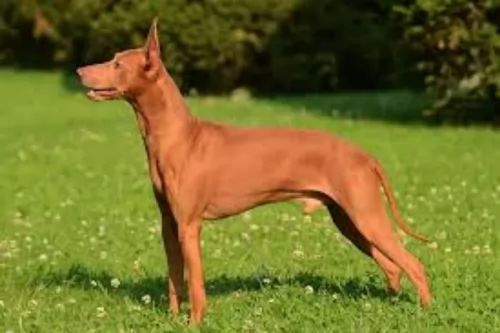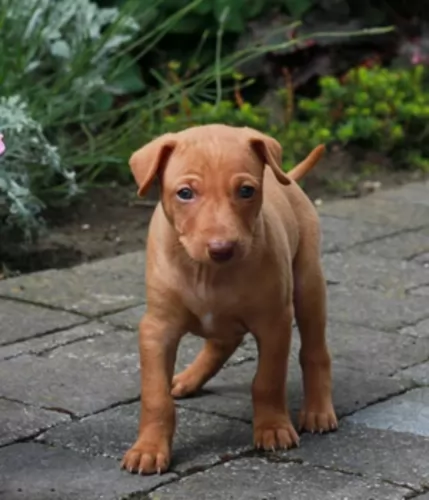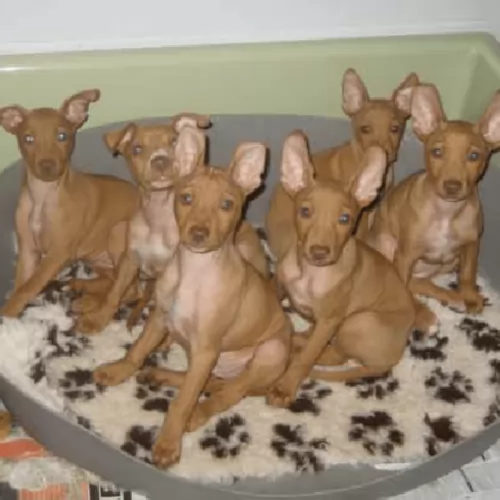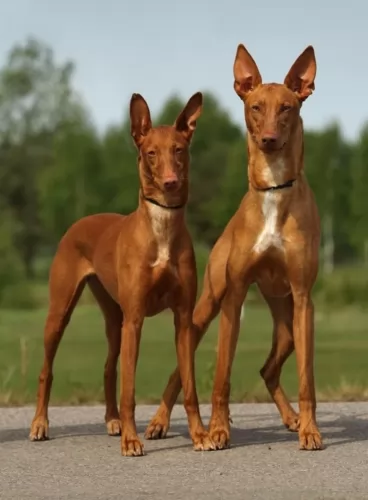 Petzlover
Petzlover Cirneco dell'Etna is originated from Italy but Scottish Terrier is originated from United Kingdom. Cirneco dell'Etna may grow 26 cm / 11 inches higher than Scottish Terrier. Both Cirneco dell'Etna and Scottish Terrier are having almost same weight. Both Cirneco dell'Etna and Scottish Terrier has almost same life span. Both Cirneco dell'Etna and Scottish Terrier has almost same litter size. Both Cirneco dell'Etna and Scottish Terrier requires Moderate Maintenance.
Cirneco dell'Etna is originated from Italy but Scottish Terrier is originated from United Kingdom. Cirneco dell'Etna may grow 26 cm / 11 inches higher than Scottish Terrier. Both Cirneco dell'Etna and Scottish Terrier are having almost same weight. Both Cirneco dell'Etna and Scottish Terrier has almost same life span. Both Cirneco dell'Etna and Scottish Terrier has almost same litter size. Both Cirneco dell'Etna and Scottish Terrier requires Moderate Maintenance.
 The Cirneco dell’Etna comes from the island of Sicily and not mainland Italy, although it is considered an Italian dog. It is a small dog that hunted rabbits and its calling card was its ability to go for hours without water or food. They have terrific endurance and a good sense of smell. They were developed for the harsh terrain they worked around places like Mount Etna. Of all the Mediterranean island hunting dogs, the Cirneco de’Etna is the smallest.
The Cirneco dell’Etna comes from the island of Sicily and not mainland Italy, although it is considered an Italian dog. It is a small dog that hunted rabbits and its calling card was its ability to go for hours without water or food. They have terrific endurance and a good sense of smell. They were developed for the harsh terrain they worked around places like Mount Etna. Of all the Mediterranean island hunting dogs, the Cirneco de’Etna is the smallest.
This is a very ancient breed, surviving on its hunting skills alone for thousands of years on Sicily. They then became guard dogs for the peasants. Because they had such speed, sense of smell, alertness and sight, they were great hunters.
Today’s Cirneco de’Etna is highly competitive in confirmation and make terrific pets. They are exceedingly friendly, energetic and low maintenance. Lure coursing is what they really excel at. They are good at agility and pursuit games as well.
 The Scottish Terrier is also known as the Aberdeen Terrier but people who love and know him refer to him fondly as the Scottie.
The Scottish Terrier is also known as the Aberdeen Terrier but people who love and know him refer to him fondly as the Scottie.
These little dogs were originally bred to hunt vermin on farms and their actual origin is ancient. It is believed that the first descriptions of these dogs date way back to 1436 with there being 2 varieties - a rough-haired Scotch Terrier and a smooth-haired English Terrier.
In 1881 the Scottish Terrier Club of England was founded with the Scottish Terrier Club of Scotland being founded in 1888. Scotties were introduced to America in the early 1890s.
 The Cirneco de’Etna is a sleek, muscular sighthound. His ears are close together and high on his head. The head is lean, and the skull is almost flat in profile. The muzzle is about the same length as the skull and the nose is large and its coloring matches the dog’s coat. They have hard pads the same color as their nails, but they are never black.
The Cirneco de’Etna is a sleek, muscular sighthound. His ears are close together and high on his head. The head is lean, and the skull is almost flat in profile. The muzzle is about the same length as the skull and the nose is large and its coloring matches the dog’s coat. They have hard pads the same color as their nails, but they are never black.
 The Scottish Terrier is a small dog, fairly robustly built but with short legs. He has a wiry, weather-resistant coat and a soft undercoat. The coat is essentially black but there are other colors too such as a wheaten shade, grey-black and brindle too.
The Scottish Terrier is a small dog, fairly robustly built but with short legs. He has a wiry, weather-resistant coat and a soft undercoat. The coat is essentially black but there are other colors too such as a wheaten shade, grey-black and brindle too.
The ears are erect, the eyes small and bright. The tail isn’t docked but is of medium length and is nearly always held up, without curling over the back.
Height at withers for both males and females should be roughly 23 to 26cm and weight in the region of 8 – 10 kg.
The Scottie is a an independent, robust breed. He is playful as a puppy, but as he matures he becomes more dignified and dour. He is stubborn, but being a terrier he is alert and makes a good watchdog. For a small dog he has a powerful bark.
Brave, loving and loyal, he can fit into life in the city or the countryside so long has he has his human family close by. He doesn’t take kindly to strangers and he he slightly aggressive with other dogs he doesn’t know. He makes a great playmate for children but he certainly doesn’t like being prodded, sat on and poked by small children.
 The Scottie is strong willed and independent, and training and socialization is important if you don’t want your Scottie believing he has the final say.
The Scottie is strong willed and independent, and training and socialization is important if you don’t want your Scottie believing he has the final say.
These dogs are stubborn and dominant and will need a strong, firm but kind owner. They’re aggressive with other dogs, but get on well with their human family.
When you bring one of these distinctive looking dogs into your home, he’ll be a loving, loyal friend.
 Like many dogs that come from ancient breeds with little cross breeding over the years, there are not a lot of inherited issues for the Cirneco de’Etna. Also, there are so few dogs remaining that little is known about their health in general and there are no studies to go on. Some breeders will do test despite the fact that none are recommended.
Like many dogs that come from ancient breeds with little cross breeding over the years, there are not a lot of inherited issues for the Cirneco de’Etna. Also, there are so few dogs remaining that little is known about their health in general and there are no studies to go on. Some breeders will do test despite the fact that none are recommended.
Their most common health issues are acquired such as injuries from running or competitions and obesity. Both can be controlled by the owner.
 Your Scottie is looked upon as being a generally healthy dog breed, but as with any other healthy dogs, he can succumb to some of the conditions and diseases that dogs get -
Your Scottie is looked upon as being a generally healthy dog breed, but as with any other healthy dogs, he can succumb to some of the conditions and diseases that dogs get -
This is an inherited blood disorder where the blood doesn’t clot properly. The dog will bleed excessively after an injury. Fortunately, while there isn’t a cure, dogs can lead normal lives.
Scottish Terriers are more prone to developing cancer than other dogs. Bladder cancer, lymphosarcoma and malignant melanoma are just some of the cancers they can get. Some cancers are treatable and there is a good success rate in dogs receiving chemotherapy.
When you brush your Scottie, look out for new, unusual lumps that could be indicative of cancer.
Scotty Cramp isn’t serious but uncomfortable for your pet. When your dog becomes worked up, you’ll see him arching his spine and he walks around for a few minutes with a stiff unnatural gait.
Obesity is regarded as a serious disease as it puts strain on the dogs joints and also creates back pain and digestive disorders.
 The Cirneco needs a good quality food since they are such high energy dogs. Be careful not to overfeed them so that they become obese.
The Cirneco needs a good quality food since they are such high energy dogs. Be careful not to overfeed them so that they become obese.
As previously mentioned, the main concern for owners is injuries acquired while on a running course or in the activities of daily living. They have been known to hurt their feet. They need their ears checked regularly for any signs of infection or irritation. Clean out any excess water or dirt.
This is an intelligent, hardy breed that needs mental and physical stimulation. They need a job, or they can be a major problem. They love hunting of course but also excel at agility, lure crossing, and competition. He is loyal and loves being with people. Take him for long walks but don’t let him off the leash.
 Scotties were once bred as working dogs, and they will certainly require daily exercise and stimulation. He will love a walk but you can’t expect him to run with you as he has short legs.
Scotties were once bred as working dogs, and they will certainly require daily exercise and stimulation. He will love a walk but you can’t expect him to run with you as he has short legs.
The Scottie sheds, so he will need to be brushed at least twice weekly. He will require quite a bit of grooming in terms of having the coat professionally trimmed and clipped.
His eyes and ears will need to be checked as well as his teeth. He can’t tell you if he has terrible toothache and while brushing him, check the teeth. Trim his nails too.
It is always recommended that you feed dogs according to size, age and activity levels. Dogs are individuals and they don’t all need the same food.
The quality of the dog food you provide makes a huge difference on your dog’s health. It always pays to go with the better quality kibble available to dogs. Your Scottish Terrier will be depending on your for quality kibble with the right blend of vitamins and minerals.
Dogs thrive on simplicity and consistency and you want to provide him with some home-made food too that gels well with his digestive system. A little bit of raw meat occasionally can also do him the world of good.
Make sure he always has cool, fresh water to drink.